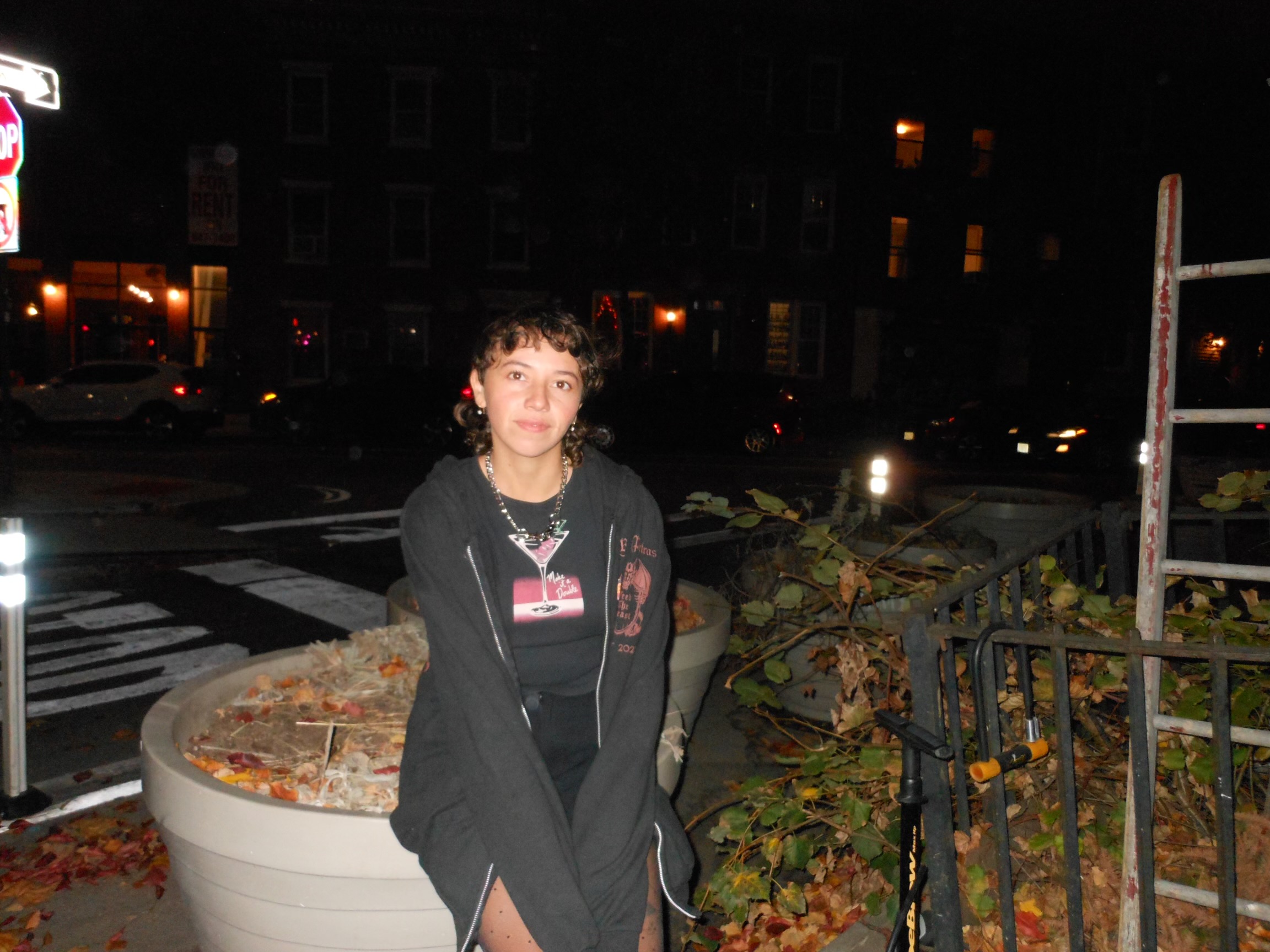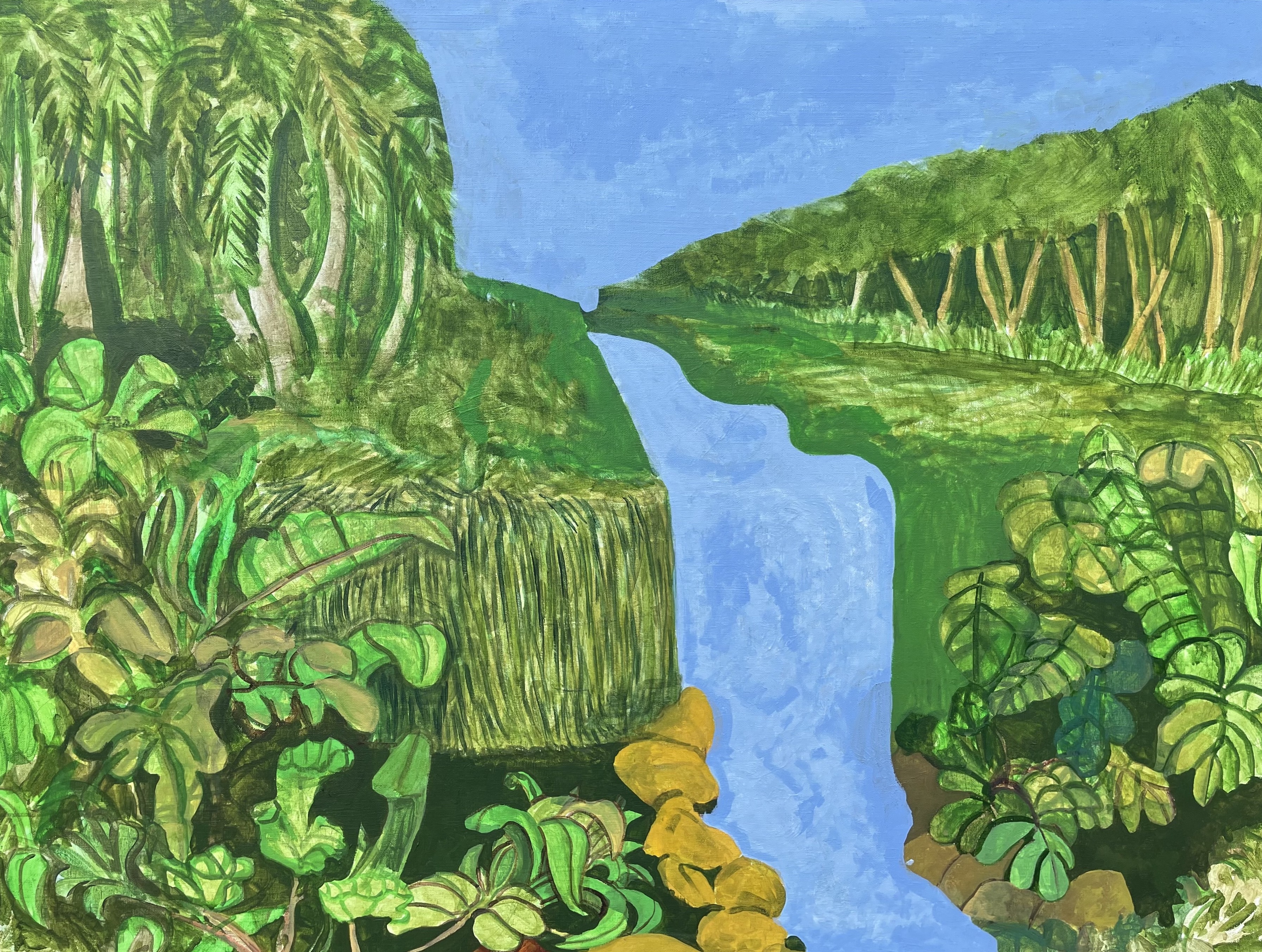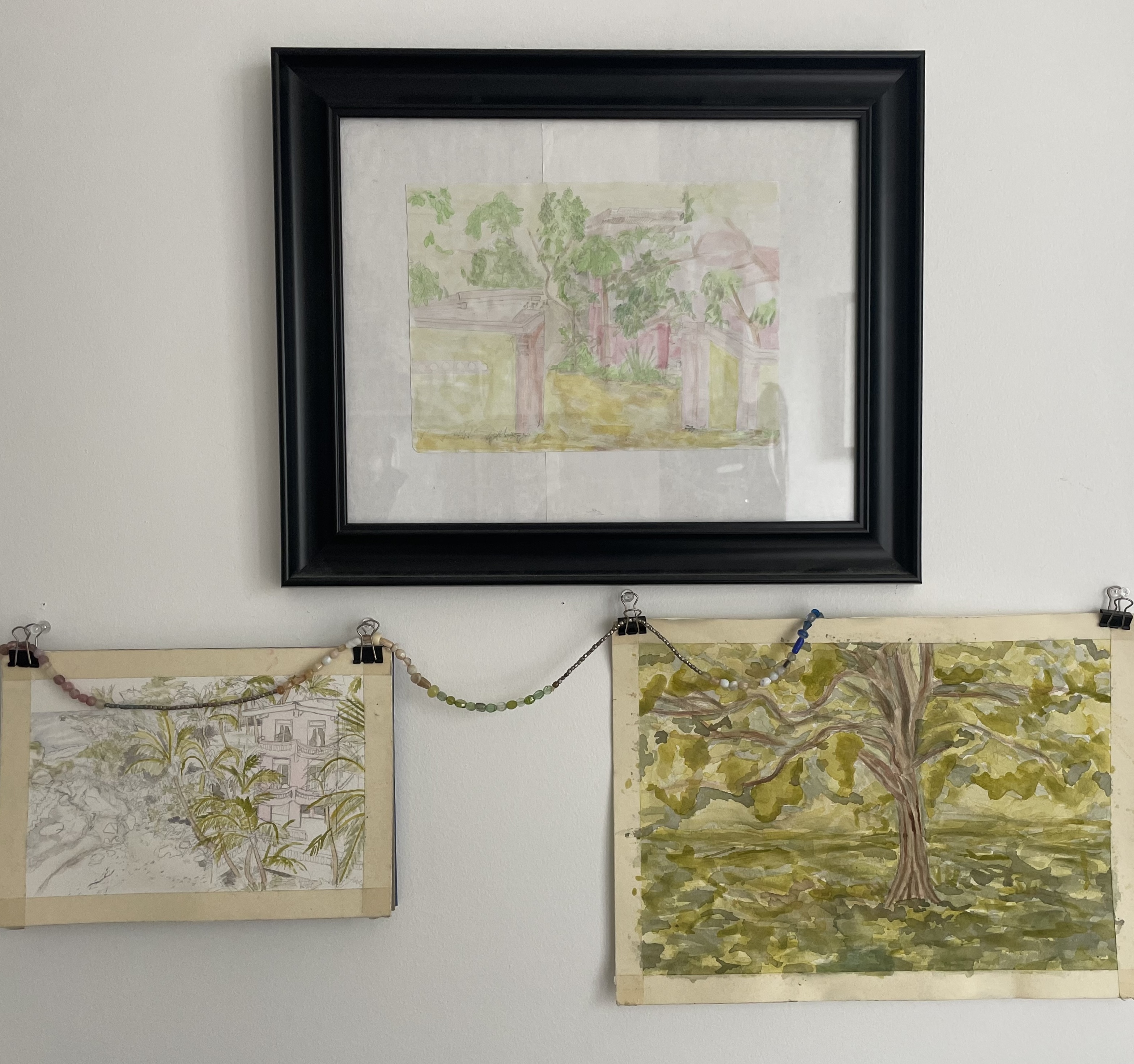
photo by: Chloe Hanson
Jianna Bennetti is the singer and songwriter of Brooklyn-based band Buni Hate Mail. On October 22nd, SplashLand editors Sarah Knight and Rylee Hickman sat down with Jianna at a bar in Crown Heights to discuss the band’s beginnings and creative process, as well as their new album Lesbian Period Piece.
Sarah: Maybe you want to start at the beginning? How you got into music in the first place?
Jianna: I definitely grew up in a really musical town. Pleasantville has a huge DIY scene because it’s just a bunch of, like, edgy kids with basements and close proximity to SUNY Purchase. A lot of older kids that I knew were into music, which I feel like got my friend group into playing music. Then I was, like, hanging with all these boys who would play after school. We’d go to our friend Mike’s house every day and play switch instruments. Everyone was playing something, and I would just be sitting on the couch, and then I was like “You know what? I could play guitar.” So then, for my 14th birthday, I got a guitar and I taught myself and I still have never taken a lesson.
Sarah: That’s crazy. Did you watch people playing guitar? Like, is that kind of how you did it? Or you just kind of messed around and figured it out that way?
Jianna: YouTube, and my friends giving me pointers and stuff.
Rylee: What do you mainly do now? In the songs and stuff, are you singing and playing an instrument? Or what’s the setup of the band?
Jianna: In the past, I used to sing and play guitar, and there was another guitarist, a bassist, and a drummer. But now the music is so much different than what it used to be. It’s just really hard to sing and play guitar sometimes. So I kind of, when we start playing shows again, I want to just sing only. Maybe play a little guitar on some songs, but really focus on singing.
Sarah: Rylee, didn’t you have a question about where the band name comes from?
Rylee: Yeah, I’m really curious! I gotta know!
Jianna: Well, in 2016 when we started the band, it was just Nani. Which is my nickname in Puerto Rico with my family. So it was originally just going to be Nani, but there’s a band in LA called Nani, and we already started the band so I was like “Oh fuck, there’s another band.” And I was like, honestly, Nani’s kind of boring anyway. So then, under Nani, we put out our first EP, which was called Bunn. Everyone in my band, we were all working at the same coffee shop together, and we would just joke about the Bunn machine all the time, I don’t know why. It just felt kind of cutesy, too. Then, we couldn’t be Nani anymore, and it turned into Buni, so like Bunn plus Nani. It’s still spelled the Puerto Rican way. And then the Hate Mail, just like the cutesy aesthetic, and it’s funny. It always makes people laugh, which I love. And it’s really weird, a lot of people pronounce it “Boo-Knee” Hate Mail.
Sarah: So you haven’t done a live show where you’ve been solely singing yet?
Jianna: No, I’ve always had something in my hands. This [next show] will be the first time. I feel like I’m not like a performer, really. So it’ll be a change. I’m actually really scared for it. From like 2017 to 2019, we were playing shows like twice a month in Brooklyn. And then, in fall of 2019, I was like “I just need to go back to school, I need to move home”, and just like- I was working all these shitty jobs, and it was kind of taking away from the ability to focus on playing music and writing. I was so burnt out and stressed. And then COVID hit, and that totally killed all of the momentum that we had to begin with. I played like two shows over Zoom during COVID, and that was…so weird.
[laughter]
Sarah: Those were some dark times. You said that your music has evolved a lot. How do you mean?
Jianna: During COVID, I was playing a lot of piano, and I got a mini keyboard, and I started learning how to use Ableton. I didn’t have a band at that time, so I was just trying to fill everything in with electronic drums and stuff. All of Lesbian Period Piece got written during COVID on the piano. And then I made all of the demos for it alone, on Ableton. So then it kind of turned into electronic/indie/alt.
Rylee: So you feel like it was mostly a circumstantial change? Or was there an intention for change too?
Jianna: It was definitely circumstantial. But also a product of different influences, too. A lot of hip-hop. And I wanted to make more electronic music. I was kind of sick of just indie rock shit. But I feel like my influences have always been a clusterfuck of different genres. When I write a song, I’ll start off wanting to write something country, and then I’ll float away from that and I want to make it a pop song. I get an idea, I work with it until I’m bored of it, and I continue on.
Sarah: Sort of like how you approached music when you were younger, switching between instruments and just following your interests. Do you think of there as being a stylistic throughline when you’re iterating through different genres during your songwriting process?
Jianna: Yeah, definitely, I feel like there’s always a baseline of alt rock throughout. A Smashing Pumpkins/Elliot Smith influence. Each song on [Lesbian] Period Piece has its own period piece– there’s the “cowboy song”, or the “vampire, dark song”, or the “angelic song”, the “natural song”--but there’s a baseline of alt-rock.
Rylee: That’s cool!
Sarah: What’s a genre of music, or an instrument, or something that you haven’t done or messed with at all, something that feels really outside of your wheelhouse, that you would be into trying?
Jianna: Honestly, I always almost get into metal, but I never do. And I really, really want to. Like, the band, Witch--that was one of the bands we would cover all the time in high school. Crazy, stoner-metal. I definitely need to improve technically as a guitar player to get there, but that’s my goal. When I can write an insane face-melter, stoner-metal solo, I’m going to be so happy.
Rylee: Okay, so, Lesbian Period Piece– you wrote it all during COVID. How did you take it from that place to where it is now? How did it change as time went on?
Jianna: It changed so much as time went on. Only, like, two of the songs are the exact same as they were when I wrote them in 2020. All of the songs have been rewritten and rewritten so many times over. Structurally and lyrically. We’ve redone all of the instruments. Like, literally, we’ve been working on it for three or four years. Even my roommate was saying like “Two years ago it sounded so different because you were into this band, and now you’re more into this band…” and you can hear every influence, every step of the way.
Sarah: It’s layered almost.
Jianna: Yeah, which I like about it. But I’m also kind of mad that I’ve gotten so caught up on myself, year after year, wanting to add more. Like, enough! Enough already! Just put it out. Which is where I’m at now. For example, when hyperpop kind of had a moment, like two years ago with 100 gecs and, like, Charli…
Sarah: Right when we were coming out of the pandemic, I feel like people really wanted that energy.
Jianna: Yeah! So it was all written and then I was, like, obsessed with hyperpop and became convinced we needed to make it a hyperpop album. And then I was kind of over hyperpop, so it changed again completely. The lyrics have changed, the song names have changed, like five times, the things I’m trying to sing about and say have changed. I’ve changed everything. But it’s at the point that there’s nothing I would change, honestly. It’s perfect. I like it. I actually like it now.
Rylee: Us too! Do you have a favorite song? Off this album, or in general.
Jianna: Probably the first song, “Pavement”. I wrote that one so long ago. That guitar riff, me and Tim, who used to play drums, we would play it with no lyrics. And I just remember we played it at one house show, and it’s really just a fun one. When I went to write lyrics to that one, they just came out and they’ve been the same ever since. So, yeah, the memories with Tim and the fact that it’s, like, simple, and it just came out of me.


Sarah: About the notebooks: do you take a lot of notes throughout the day?
Jianna: Usually we go to the studio, we work all day in the studio, get the bounces, I come home, I smoke a joint, I listen back, and I’m writing notes while I do that. “Oh, that is too loud”, or “This needs more reverb.” I’ll write it out almost like I’m filling out an Excel sheet with notes on every aspect of the song. Page after page. I’ll have one of those Excel sheets until it’s full, and then I’ll make a new one. So, there’s probably like, 20, for each song. Keeping notes is a huge part for me. If I ever scanned it all in, it’d be a massive document of crazy scribbles and that shit.
Sarah: I hope you keep that stuff, though.
Jianna: Yeah, and looking back at it is really fun.
Rylee: I also wanted to ask about your visual art. How similar or different is that process from creating a song? I think it’s interesting when people have two very seemingly separate art practices like that.
Jianna: Yeah, I was thinking about that, and I realized how similar those practices actually feel. Especially describing my music process out loud right now, how chaotic it sounds… My visual art is the same. I have, like, five paintings at a time that I’m working on. When I’m in the mood, I’ll pick one of them up. Finishing a piece of visual art is like a marathon for me. Like this album has been. One of these paintings is over ten years old and I’m still working on it. So I feel like my shit is never done and it’s always in progress. But in terms of subject matter maybe they’re less related. I do watercolor and oil paintings of tropical landscapes, really earthy, leafy shit. Like it’s not like queer, really. I feel like the music is always a love song, or it’s about some personal people-related problem, but the paintings are focused on nature. No people. So it’s kind of the opposite in that way.
Sarah: Is the mood that you get into when you’re in the mood to paint is the same as the mood that you get into when you’re in the mood to make music?
Jianna: I feel like when this album is officially done, I’m going to be in a painting mood. I’m not going to want to do any music, I feel like, until I work on some paintings for a while. Like, when I feel free from the music, that’s when I’m into painting. When I’m in a painting mood is when I’m also in a writing music mood. Like, coming up with ideas for songs, and also listening to a lot more music too. When I come home from work or whatever, I’ll hyperfixate on listening to this album, and thinking about it, and I’m not really listening to so much music. I feel like I listen to most of my other music at work.
Sarah: That's fair.
Jianna: Yeah, I don’t really listen to music on the train because it’s so loud, like you can’t really hear it.
Rylee: Okay, I feel the same way, and people make fun of me for that.
Sarah: Yeah, I could never do what you guys do.
Jianna: I don’t listen to music on the train. And I don’t- I like the radio. If I’m cleaning my room, I’ll turn on the radio. I don’t really like to have to pick it. Unless I’m smoking a blunt, then that’s when I’ll put on music.
Sarah: Do you listen to the radio on your phone or do you have a radio?
Jianna: I have a radio. Also, I pick up my dad’s car a lot so I’ll listen to the radio in the car, or in my room.
Sarah: That is one thing that I really associate with driving that I miss about it, is listening to the radio.
Jianna: Yeah. I never fuck with the aux. I find so much music on the radio.
Rylee: What station are you listening to? Like, what genre?
Jianna: There’s a really good 90s hip-hop station, or like R&B. And Spanish music, like reggaeton music.
Sarah: Given that you love the radio, how do you feel about the Spotify algorithm and all the hyper-personalized music we have right now? Do you have a take on that?
Jianna: It’s so funny, because when you have music as an artist on Spotify, you can see insights: how many streams in Brooklyn, how many streams in Manhattan… And if somebody puts your music on a playlist, you can see the name of that playlist. So that’s really interesting to me.
Sarah: What playlists are people putting your music on? Any standouts?
Jianna: Maybe like “Crying” [laughs]. I mean, I hate all of that, in a way, but this is the moment we’re in. I feel like it’ll all explode soon, the streaming thing. I hope it does. I’m still going to make vinyls and tapes.
Rylee: I wanted to make sure I asked about queerness in your music. I know you just said your paintings don’t feel really queer, but does your music? I just wanted to know how you feel like your queerness influences your creative process. Or the output, either way.
Jianna: It definitely influences the lyrics. Because, like, girls… I could write a million songs about girls. And other queer music, queer media in general, has really influenced the aesthetics and the sound of Lesbian Period Piece. Like the movie Bound. Have either of you guys seen that movie?
Rylee: No, but I know about it.
Jianna: It’s so awesome! It’s so badass, sleek, mafia, leather jackets…
Sarah: It’s a queer mafia movie?
Jianna: Yes!
Sarah: I have to watch it. I’ve never heard of it.
Jianna: Or the book Mrs Dalloway, The Handmaiden, that movie… Yeah, that’s like one of my favorite movies of all time.
Rylee: That’s a good movie.
Jianna: The Favourite. All of those. I’m so obsessed with them and I love those aesthetics. It’s hard not to let that influence what I’m trying to write about, because it’s just so powerful to me. Also, just drawing from queer art history, too, and referencing that stuff, is really cool to me. Especially how under-referenced I feel like it is. I just want to feed the community some new shit to think about. So lyrically, sonically, it’s in there for sure.
Rylee: Yeah, it feels like it when you listen to it.
Jianna: That’s the best news ever.